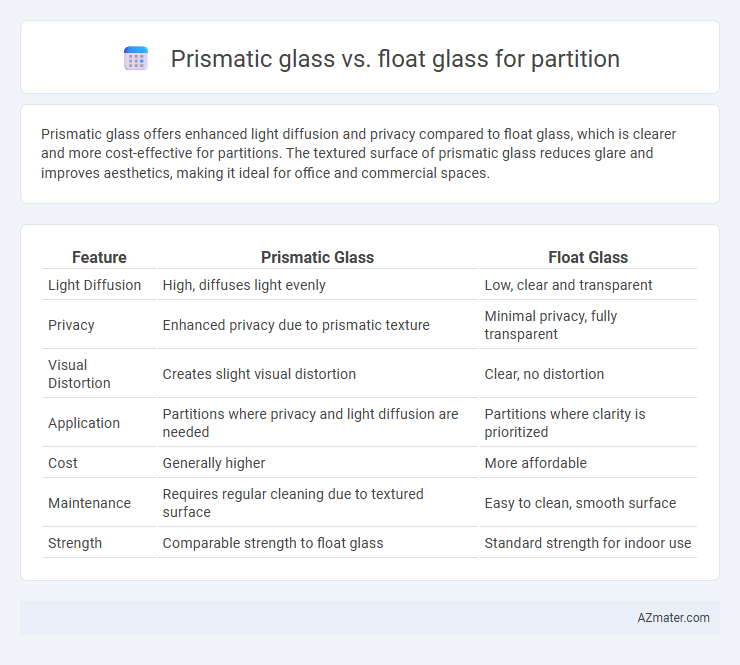Prismatic glass offers enhanced light diffusion and privacy compared to float glass, which is clearer and more cost-effective for partitions. The textured surface of prismatic glass reduces glare and improves aesthetics, making it ideal for office and commercial spaces.
Table of Comparison
| Feature | Prismatic Glass | Float Glass |
|---|---|---|
| Light Diffusion | High, diffuses light evenly | Low, clear and transparent |
| Privacy | Enhanced privacy due to prismatic texture | Minimal privacy, fully transparent |
| Visual Distortion | Creates slight visual distortion | Clear, no distortion |
| Application | Partitions where privacy and light diffusion are needed | Partitions where clarity is prioritized |
| Cost | Generally higher | More affordable |
| Maintenance | Requires regular cleaning due to textured surface | Easy to clean, smooth surface |
| Strength | Comparable strength to float glass | Standard strength for indoor use |
Introduction to Prismatic Glass and Float Glass
Prismatic glass features a patterned surface designed to refract and diffuse light, enhancing privacy while maximizing natural illumination, making it ideal for office partitions. Float glass, produced by floating molten glass on a bed of molten metal, offers a smooth and uniform surface with high clarity, often used where transparency is essential. Selecting between prismatic and float glass depends on the balance between light diffusion needs and visual clarity in partition applications.
Composition and Manufacturing Differences
Prismatic glass features a patterned surface created by pressing molten glass into a prism-like mold, introducing refraction properties that enhance light diffusion and privacy, while float glass is produced by floating molten glass on a bed of molten tin to create a smooth, flat, and clear surface. The composition of both glasses mainly involves silica, soda ash, and limestone, but prismatic glass may include added additives to improve durability and light manipulation properties. Manufacturing float glass emphasizes uniform thickness and clarity for visibility in partitions, whereas prismatic glass manufacturing focuses on surface texture and optical effects to control light transmission and visual obstruction.
Visual Appearance and Light Diffusion
Prismatic glass enhances visual appearance by creating intricate patterns that refract light, offering superior light diffusion compared to float glass's flat, clear surface. Float glass provides uniform transparency with minimal distortion, ideal for clear visibility but limited in scattering light. The choice between prismatic and float glass influences interior ambiance, with prismatic glass promoting softer, diffused lighting and aesthetic richness.
Strength and Durability Comparison
Prismatic glass offers enhanced strength and durability compared to standard float glass due to its textured surface, which distributes stress more evenly and reduces the risk of impact damage. Float glass, while smooth and clear, is generally more prone to scratches and breakage under heavy load or impact in partition applications. The structural integrity of prismatic glass makes it a superior choice for partitions requiring both aesthetic appeal and long-lasting performance.
Acoustic Performance for Partitions
Prismatic glass enhances acoustic performance in partitions by scattering sound waves, reducing echo and improving speech privacy compared to traditional float glass, which primarily relies on thickness and density for sound insulation. The textured surface of prismatic glass disrupts sound transmission, making it ideal for office environments where noise control is critical. Float glass offers a clear, smooth finish but less effective sound attenuation, making prismatic glass a superior choice for partitions requiring advanced acoustic management.
Thermal Insulation Properties
Prismatic glass enhances thermal insulation in partitions by diffusing sunlight and reducing glare, which helps maintain consistent interior temperatures and lowers energy consumption. Float glass, while cost-effective and commonly used, offers limited thermal insulation as it primarily serves as a clear, flat glazing material without inherent light-diffusing properties. Choosing prismatic glass over float glass can significantly improve energy efficiency and indoor comfort in partition applications.
Privacy and Aesthetic Applications
Prismatic glass enhances privacy by diffusing light and obscuring visibility, making it ideal for partitions in office spaces and conference rooms where discretion is essential. Float glass offers a clear, smooth surface that maximizes transparency and natural light flow, suitable for open-plan areas requiring visual connectivity. Choosing prismatic glass supports aesthetic applications through textured patterns that create dynamic light effects, while float glass provides a sleek, minimalist look that complements modern architectural designs.
Installation and Maintenance Considerations
Prismatic glass offers enhanced light diffusion, reducing glare and providing privacy, which requires precise installation to maintain its textured surface integrity. Float glass, known for its smooth and flat finish, is easier to handle and install but may need additional treatments for privacy. Maintenance of prismatic glass involves careful cleaning to avoid surface damage, while float glass is more resilient to common cleaning methods and scratches.
Cost Analysis: Prismatic vs Float Glass
Prismatic glass typically costs 20-30% more than float glass due to its specialized light diffusion properties and manufacturing process. Float glass is more affordable and widely available, making it a cost-effective choice for large-scale partitions where budget constraints are critical. The higher initial investment in prismatic glass can be offset by energy savings and enhanced natural lighting efficiency in commercial spaces.
Best Use Cases in Modern Interiors
Prismatic glass enhances natural light diffusion and privacy, making it ideal for office partitions and modern residential interiors where both aesthetics and functionality are crucial. Float glass offers a clear, smooth surface best suited for spaces that require unobstructed views and a sleek, minimalist look. Selecting prismatic glass for areas requiring glare reduction and float glass for open, transparent environments optimizes lighting and spatial perception in contemporary interior design.

Infographic: Prismatic glass vs Float glass for Partition
 azmater.com
azmater.com